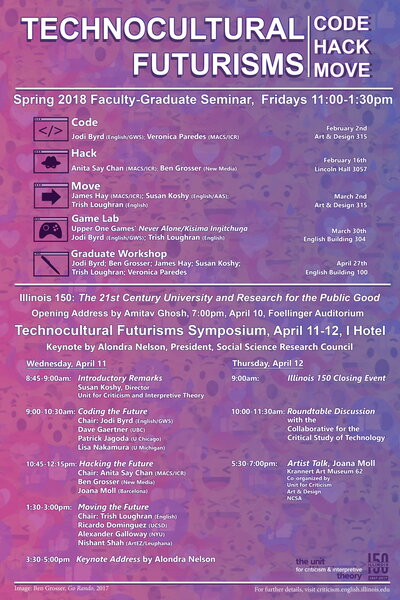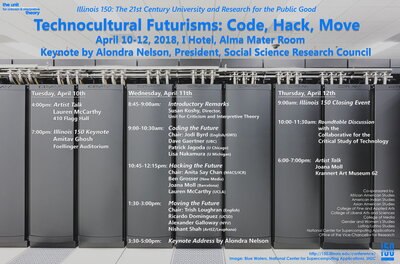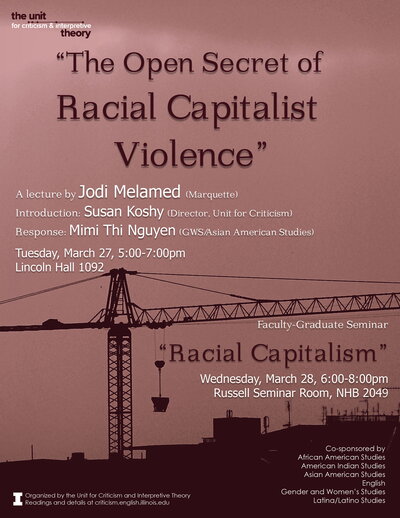
Click here to see the Spring 2018 Radical ColLabs
Click here to see the Spring 2018 Seminars
Technocultural Futurisms: Code, Hack, Move


Symposium:
The 150th anniversary of the University of Illinois as a land-grant institution, founded on what was then a radically new vision of technical and agricultural education for ordinary US citizens, offers a moment to reflect on the central role technology plays in the way we imagine the future. The Collaborative for the Critical Study of Technology, which draws members from across the humanities, arts, social sciences, and STEM fields, will place this notion of technological futurity in conversation with work in critical race, gender, sexuality, transnational, and indigenous studies through a symposium titled “Technocultural Futurisms: Code, Hack, Move.” The Sesquicentennial provides an opportunity to consider the role of the university itself in such imaginings. We ask: what role has the land grant-institution played in moments of technological transformation, past and present? What (and whose) futures have historically been imagined at universities such as Illinois since the mid-nineteenth century, and which of these imagined futures has come to pass?
Seminars:
“Futurisms” are artistic and political movements that challenge existing norms and dream up alternative futures. Such movements tend to erupt at moments of transition, when existing paradigms have been exhausted and the trajectories of the past no longer serve. This is such a moment, both here at UIUC and globally, and as such demands living and lively engagement. To this end, our subtitle--Code, Hack, Move--foregrounds modes of active intervention, gesturing towards critical engagements that seek not to break or replace current regimes but to re-make and re-direct them to ends towards which they may not have been originally intended. Coding, hacking, and moving are all cultural acts of imagination and reimagination as much as technical ones, and as such they have the capacity to bridge the perceived divide between the STEM fields and the arts, humanities, and social sciences. “Code” is the language through which our contemporary world is being articulated; “hack” suggests one possible way we might intervene in it; and “move” marks its affective potential, its ability to transform. Our goal this semester is to explore these three arenas of imaginative and technological action by placing them in conversation with critical race, gender, sexuality, transnational, and indigenous studies in order to theorize the future that our present material conditions allow us to imagine.
Friday, Feb 2: Code
Seminar Instructors: Veronica Paredes (MACS/ICR); Jodi Byrd (English/GWS)
Friday, Feb 16: Hack
Seminar Instructors: Ben Grosser (New Media); Anita Say Chan (MACS/ICR)
Friday, March 2: Move
Seminar Instructors: James Hay (ICR); Trish Loughran (English); Susan Koshy (English)
Friday, March 30: Game Lab for Upper One Games’ Never Alone/Kisima Inŋitchuŋa
Lab Organizers: Jodi Byrd (English/GWS); Trish Loughran (English)
Friday, April 27: Graduate Workshop
With Jodi Byrd, Ben Grosser, James Hay, Susan Koshy, Trish Loughran, and Veronica Paredes
Jodi Melamed, "Racial Capitalism"
Wednesday, March 28th, 6:00-8:00 pm
Location: Russel Seminar Room, Natural History Building 2049
Jodi Melamed is associate professor of English and Africana Studies at Marquette University. Her current research aims to provide an anti-racist critique of contemporary global capitalism and an anti-capitalist critique of historically dominant U.S. anti-racisms. She is the author of Represent and Destroy: Rationalizing Violence in the New Racial Capitalism (University of Minnesota Press, 2011) and a contributor to Strange Affinities: The Sexual and Gender Politics of Comparative Racialization (Duke University Press, 2011) and Keywords for American Cultural Studies (NYU Press, forthcoming). Her next book project, Capital’s Metabolisms investigates representational and relational dimensions of ‘bio-financialization’ (the nexus linking life and financialization) in neoliberalism. Her areas of interest include critical race and ethnic studies, woman of color feminism and queer of color critique, political economy, and culture and globalization. Her awards, fellowships, and grants include a Fulbright, a Woodrow Wilson Postdoctoral Fellowship, and grants from the American Studies Association, the Social Science Research Council, the Mellon Foundation and the Wisconsin Humanities Council. Currently, she serves as Co-Chair of the American Studies Association’s Program Committee and as a member of the Modern Language Association’s executive committee for the division on sociological approaches to literature.
To register or for readings please email Roman Friedman (unitraroman@gmail.com) or Alyssa Bralower (unitra.alyssa@gmail.com).
